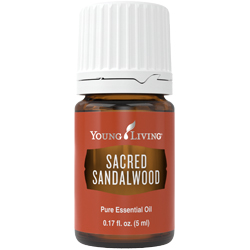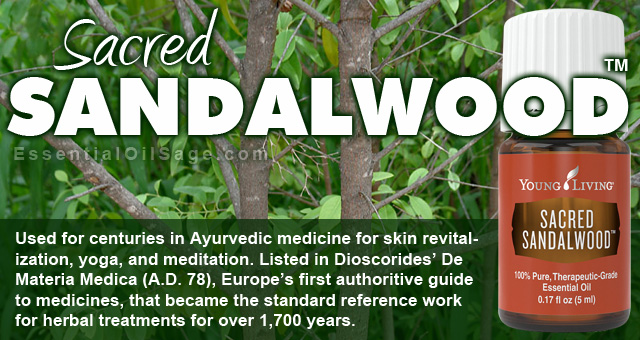This variety of sandalwood (Santalum album) is native to India but is cultivated and steam distilled at our partner farm in Australia’s tropical northern outback. Sacred Sandalwood essential oil provides an uplifting, warm, woodsy, and sweet aroma, while offering a variety of skin benefits. Sandalwood is a recognizable base note in many perfumes and fragrances. Its distinctly warm and woodsy aroma is the perfect complement to pampering spa treatments, relaxation time, yoga, and meditation. It can also help you recapture the qualities of younger-looking skin and enhance your favorite skin and hair products.
To ensure the purest, most authentic oil possible, Young Living’s Sacred Sandalwood essential oil comes from the highly sought-after Santalum album tree species transplanted from its native home in India to our partner farm in Australia, which has a similar landscape and climate. From there, each step of the cultivation process is closely regulated and monitored according to our strict Seed to Seal® guidelines.

|
||
| 5 ml | ||
| Retail | $131.25 |
|
| Wholesale | $99.75 | |
Related Posts
Botanical Family: Santalaceae
Plant Origin: Australia
Extraction Method: Steam distilled from wood
Key Constituents:
- Alpha-Santalol (41-55%)
- Beta-Santalol (16-24%)
ORAC: 160 µTE/100g
How To Use
- Apply topically to enhance the natural radiance of healthy-looking skin.
- Add to your daily skin care regimen to reduce the appearance of fine lines and puffiness.
- Add to a bath or hot towel treatment for an immersive, spa-like experience.
- Use this warm, luxurious aroma as a sophisticated personal fragrance.
- Diffuse during yoga, meditation, or prayer to support a spiritually focused atmosphere.
- Caution: Keep out of reach of children. If you are pregnant, nursing, taking medication, or have a medical condition, consult a health professional prior to use.
BLENDS containing Sacred Sandalwood essential oil
- 3 Wise Men
- Acceptance
- Awaken
- Brain Power
- Build Your Dream
- Celebration
- Chivalry
- Divine Release
- Dream Catcher
- Forgiveness
- Gathering
- GeneYus
- Harmony
- Highest Potential
- Inner Child
- Inner Harmony
- Inspiration
- InTouch
- Journey On
- Lady Sclareol
- Live Your Passion
- Loyalty
- Magnify Your Purpose
- Oola Grow
- Release
- Reconnect
- Transformation
- Trauma Life
- T-Away
- T.R. Care
- White Angelica
PERSONAL PRODUCTS containing Sacred Sandalwood essential oil
- ART Gentle Cleanser
- ART Intensive Moisturizer
- ART Light Moisturizer
- ART Refreshing Toner
- ART Sheerlumé Face Cream
- ART Skin Care System
- Boswellia Wrinkle Cream
- Evening Peace Bath & Shower Gel
- KidScents Tender Tush
- Lemon-Sandalwood Bar Soap
- LBriante (Winter Blend)
- Mirah Luminous Cleansing Oil
- Mirah Shave Oil
- Sandalwood Moisture Cream
- Tender Tush
- Wolfberry Eye Cream
* This statement has not been evaluated by the Food and Drug Administration. This product is not intended to diagnose, treat, cure or prevent disease.


At 1:41, the shop’s entryway is shown—Wing Lee Sandalwood Co. So I thought Agarwood might be another name for Sandalwood. Turns out they are different…
From Wikipedia: “Sandalwood, along with agarwood, is the most commonly used incense material by the Chinese and Japanese in worship and various ceremonies.” https://en.wikipedia.org/wiki/Sandalwood
Also from Wikipedia: “Agarwood, ALOESwood or gharuwood is a fragrant dark resinous wood used in incense, perfume, and small carvings. It is formed in the heartwood of aquilaria trees when they become infected with a type of mould. Prior to infection, the heartwood is odourless, relatively light and pale coloured; however, as the infection progresses, the tree produces a dark aromatic resin, called ALOES or agar as well as gaharu, jinko, oud, or oodh, in response to the attack, which results in a very dense, dark, resin-embedded heartwood. The resin-embedded wood is valued in ARABIC-MIDDLE EASTERN eastern culture for its distinctive fragrance, and thus is used for incense and perfumes. The aromatic qualities of agarwood are influenced by the species, geographic location, its branch, trunk and root origin, length of time since infection, and methods of harvesting and processing.” https://en.wikipedia.org/wiki/Agarwood
Two thoughts…
1. Could agarwood be the real ALOES of the Bible? Not the Sandalwood that is currently in our Oils of Ancient Scripture Kit – https://essentialoilsage.com/?p=2987. (No problem with the Sandalwood in the kit. Just an objective question.)
2. How long before Young Living has an Agarwood farm in China or Japan? 🙂
Royal Hawaiian Sandalwood vs. Sacred Sandalwood: Why to keep both in your collection
The warm, woodsy aroma of Sandalwood essential oil is a favorite of spas, perfumers, and yogis—and quite a few of us here at Young Living. In fact, we love it so much that we have two varieties available: Royal Hawaiian Sandalwood®* and Sacred Sandalwood™. Why not settle for one Sandalwood and call it good? Because
Harvesting Sandalwood at the Quintis Farm
Sandalwood Sustainability at Quintis, Young Living Partner Farm
Young Living, the largest essential oil company in the world, paid a total of $US8.55m for 2.85 tonnes of sandalwood oil, at a 33 per cent discounted price, as part of a five-year agreement announced last September.
The earlier agreement covered the purchase of 7.8 tonnes of oil spread over five years at a price of $US4500 per kilogram.
This sudden sale of 2.85 tonnes brought forward about two years of supply under the offtake agreement and Quintis received $US6m in cash from the sale. Full Story
Young Living has paid 6 million in advance for sandalwood oil to help financially-strapped supplier Quintis.
One potential wrinkle: Young Living rejects any oil that doesn’t meet its high standards. The rejected suppliers then sell the inferior oil on the open market to companies with lower standards (basically, the rest of the industry…they either don’t have the necessary equipment and expertise to perform such detailed tests and/or that simply don’t care).
Although the article doesn’t provide those details, I suspect this deal includes a clause in which, if the oil does not meet Young Living standards, Quintis will reimburse Young Living’s investment with funds from the proceeds of oil that will be sold to companies that don’t mind marketing inferior oils.
Articles are now behind a paywall, but gritty details can be found here…
Mar 22, 2017 – Shares in sandalwood grower Quintis fall for second day
Jun 29, 2017 – Quintis reaps $7.9m in cash from sandalwood oil sale
Jun 30, 2017 – Quintis discounts sandalwood to boost finances
Jul 27, 2017 – Quintis backers team up for fight to save outlay
Sep 29, 2017 – Quintis vows it will survive crisis
Nov 16, 2017 – Short seller queries Quintis oil price after writedown
[Quintis] disclosed today it had sold $11.3 million of sandalwood album oil to global giant Young Living. The bulk sale of the 2.85 million tonnes of oil is part of an off-take agreement signed with US-based Young Living in September 2016. Full Story
More details on Young Living’s sandalwood supplier. We’re talking big biz. Are we early witnesses to the return of economies based on real commodities? Like in ancient times when kings traded spices and essential oils? The synthetic world in which we’ve grown complacent after a few generations may come crashing down quickly. Full story.
TFS Corporation Limited puts another piece of the puzzle in place
Should you buy TFS Corporation Limited (ASX:TFC) shares?
Young Living inks deal to buy Indian sandalwood oil from an Australian company at $US4500 a kilogram plus fixed annual increases of 2.5 percent a year. First shipment of oil is expected in October 2016 with monthly supplies thereafter.
Exciting news since sandalwood has become endangered in India due to tree poachers. YL had to discontinue it a few years ago due to short supply and replace it with Royal Hawaiian Sandalwood.
Will YL be offering traditional sandalwood again in a couple of months? According to my calculations, the raw cost to YL is $22.50 per 5ml bottle. Of course, that doesn’t include transport, testing, bottling, general overhead costs and distributor commissions. Full story.